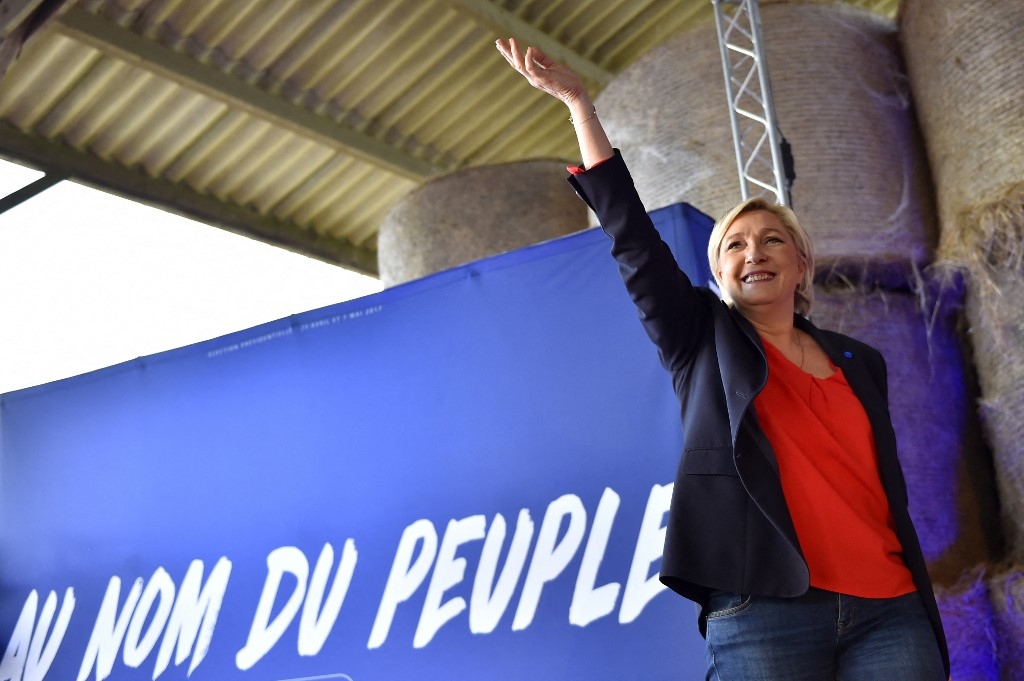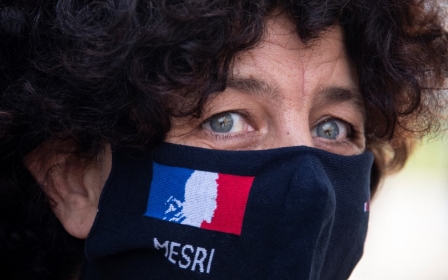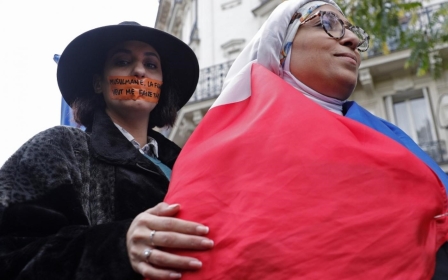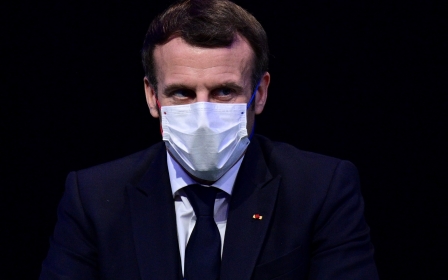How France mainstreamed the far right

This past weekend, tens of thousands of people across France marched against the growing influence of the far-right.
It’s been an eventful few months in French politics. Last week, a video by a far-right YouTuber offering a tutorial on how to kill a leftist - complete with a bullet-riddled mannequin and advice on where to purchase arms - received more than 100,000 views before being taken down by YouTube.
Desperate to recoup Le Pen's gains, politicians of all stripes have courted her base - and in so doing, widened her party's appeal by legitimising her 'grievances'
There was the now-infamous “slap” by a member of the public against President Emmanuel Macron, clearly designed to humiliate him in the classic machismo style of fascists. Then, left-wing leader Jean-Luc Melenchon had flour thrown over him by another alleged far-right activist.
Meanwhile, an undercover agent foiled a plot by self-proclaimed “patriots” to poison halal sections in supermarkets. All of this came in the wake of an open letter to Macron by around 1,000 members of the French military, which suggested that a military coup was needed to confront the threat of “Islamism” and “hordes” from the banlieues.
The next day, one of the generals who signed the letter was invited onto primetime TV to give his views on whether Islam was compatible with France. A subsequent poll indicated that 58 percent of French people agreed with the analysis put forward in the letter published in a far-right outlet to which Macron previously (and controversially) gave an interview.
New MEE newsletter: Jerusalem Dispatch
Sign up to get the latest insights and analysis on Israel-Palestine, alongside Turkey Unpacked and other MEE newsletters
Courting Le Pen's base
While the growth in the presence and visibility of National Rally leader Marine Le Pen’s party across France’s political map has served to normalise a far-right discourse in the country for decades, the movement in France today is far bigger than Le Pen.
It stretches to every corner of society and every recess of the French political map, where, desperate to recoup Le Pen’s gains, politicians of all stripes have courted her base - and in so doing, widened her party’s appeal by legitimising her “grievances”.
Chief among them is Macron, whose interior minister, Gerald Darmanin, recently harangued Le Pen for being “almost a bit soft” on Islam, while backing some of the most regressive legislation in modern French history. Despite his centrist claims, Macron’s government has been instrumental in shifting the entire centre far to the right.
And this isn’t only in politics. Today, a far-right pseudo-intellectual elite exploits fear for lucrative gains.
On television, polemicist Eric Zemmour, convicted multiple times for inciting racial hatred, drip-feeds his theories of white replacement and civilisational siege to mollified audiences on France’s most-watched channel, CNews, the French version of Fox News.
He’s not alone: 36 percent of all political guests on CNews are from the far right, while studies show the movement is over-represented in French media more broadly.
Much has been written about how the far right has led the right too far, but in a country that has long prided itself on its strong socialist traditions, the absence of a left wing politically capable of countering the far right is glaring. This is partly down to the “Trump-isation” of the French left, which sought to undercut the far right by playing on its terrain, but instead reinforced an ultra-conservatism across the board. The result: Almost half of French people now believe that “Islam is a threat to French identity."
'Far-right leftism'
As the academic Jacques Ranciere has pointed out, in the battle to uphold Republican values, the left mobilised traditional leftist ideals on laicite, fighting antisemitism and equality of the sexes, but subverted them entirely, producing a new form of “far-right leftism” that is increasingly in sync with Le Pen’s racist focus.
How did leftist ideals get subverted in the service of fascism? It has been partly through the refusal to extend social solidarity to all those who make up the French nation. Instead, an underlying and unresolved racism refuses to fully recognise Black and Arab French men and women as equals. Rooted in white supremacy and dressed up as “defence of the nation”, it is whitewashed nationalism with a socialist twist.
The consequence, from left to right, is a growing problematisation of Islam and immigration. Le Pen’s “populist martyrdom” increasingly speaks to a previously leftist electorate that has become disenchanted with the rotation of elites embroiled in incessant corruption scandals. Since winning more than 30 percent of votes in the second round of the 2017 presidential election, Le Pen's real success has been in ensuring that her political agenda subsumed those of all other parties.
It’s no longer that the mainstream merely “flirts” with the far right; today, it openly courts it.
In a recent study of the use of the far-right term “Islamo-leftist” (currently used to tar oppositional academics), the French National Centre for Scientific Research studied more than 290 million tweets with political connotations posted since 2016, and found that it was associated with terms such as “traitor, enemy of the republic, immorality, corruption, as well as menace, insecurity, danger, alliance with the enemy and … compromise with radical Islamism”.
All of these far-right themes have been rehashed repeatedly by senior government ministers. The centre’s conclusion was unabashed: “According to our measurements, the ministers of the government have succeeded in doing in four months what the extreme right has struggled to do in more than four years.”
Blatant Islamophobia
While Macron has sought to pass some of the most worrying bills in modern French history, the left has been almost entirely absent with regards to the blatant Islamophobia running through them. In fact, many on the left don’t even recognise it exists.
This year, despite warnings from human rights groups that the government’s proposed “separatism” bill would lead to further discrimination against Muslims, parties across the political spectrum voted to support it. The Socialist Party went so far as to say the bill “avoids the trap of stigmatising a whole religion”.
Today in France, Islamophobia represents a political consensus, leaving French Muslim citizens politically disenfranchised amid a growing focus on their faith as a political battleground and rising discrimination.
There will be no 'Republican front' to counter the far right - just a scramble to mop up as many of its themes as possible by a pusillanimous political class
A study published last year on the impoverished Paris district of Seine-Saint-Denis found that 80 percent believed residents were discriminated against on the basis of their skin colour, postcode or religion. Almost nine in 10 young people from the area believed they were discriminated against by police and the justice system.
Meanwhile, a new study has revealed that discrimination in employment has almost doubled in the last 20 years in France. And France’s official commission on human rights recorded an 11 percent rise in racist acts in just one year, highlighting in particular anti-Black racism.
As election season begins to heat up, there will be no “Republican front” to counter the far right - just a scramble to mop up as many of its themes as possible by a pusillanimous political class. Bereft of the courage to offer a unifying and alternative vision of who “we” in France in 2021 truly are, mainstream parties are convinced that not being Le Pen - but being very close to being Le Pen - will be enough to be elected. That may well be a gamble that France cannot afford to lose - but to many, it will be a loss either way.
The views expressed in this article belong to the author and do not necessarily reflect the editorial policy of Middle East Eye.
This article is available in French on Middle East Eye French edition.
Middle East Eye delivers independent and unrivalled coverage and analysis of the Middle East, North Africa and beyond. To learn more about republishing this content and the associated fees, please fill out this form. More about MEE can be found here.







